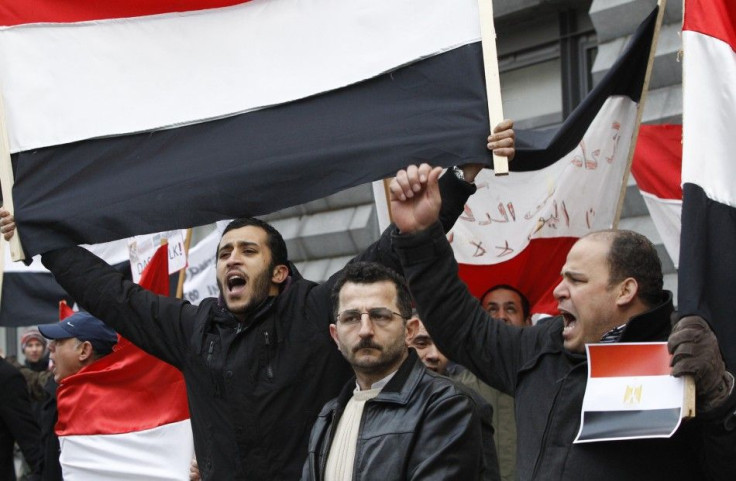Pro- and anti-Mubarak groups skirmish in Cairo

An Egyptian army tank moved against supporters of President Hosni Mubarak as they hurled rocks at anti-Muburak protesters in central Cairo, prompting cheers from demonstrators battered by overnight fighting that killed six.
Allahu Akbar, the army and the people are hand in hand, chanted protesters barricaded in Tahrir (Liberation) Square, where 10,000 people on Thursday joined the hundreds who had camped overnight.
The Mubarak loyalists fled when the tank turned its turret towards them, then regrouped nearby and resumed throwing stones.
Gunfire was later heard in the square, the centre of demonstrations seeking to end Mubarak's 30 years of authoritarian rule, Al Arabiya TV reported. The broadcaster said Mubarak supporters stormed hotels, chasing foreign journalists.
On Monday the army emboldened protesters by endorsing their demands as legitimate and pledging not to open fire on them. But until Thursday the soldiers had not really intervened.
In Egypt's second largest city of Alexandria, thousands protested with anti-Mubarak banners, one reading: In all languages of the world, we tell you: go out, Mubarak.
In northeastern Egypt, around 4,000 people marched in Suez calling for Mubarak to step down, while in Ismailia a crowd of 2,000 held a similar demonstration.
In Cairo protesters lined up small rocks to fight off attacks by pro-Mubarak groups.
We are using these stones as a means of defence. Yesterday they attacked us with molotov cocktails (petrol bombs) and all we have to protect ourselves with is stones, said Ali Kassem.
A Reuters journalist saw protesters overpower someone they said was an undercover member of the security services.
Over a loudspeaker a voice urged: Don't beat him. Hand him to us and the organising committee and we will hand him over to the army. The international media is watching us and saying we are peaceful people.
Some protesters say the pro-Mubarak supporters have been paid for by Mubarak's National Democratic Party (NDP).
Mobile phone operator Vodafone accused the Egyptian authorities of using its network to send pro-government text messages to subscribers, without clear attribution. One message sent on Feb 2 seen by Reuters announced the location and timing for a pro-Mubarak rally.
If they don't want the president to go, okay, but let's see whose voice is louder...what I saw last night made me want to stay longer, it strengthened my resolve, said Ilham Farouk, a 27-year-old pharmacist in a full face veil.
OVERNIGHT VIOLENCE
Egypt's health minister said six people were killed and 836 wounded in the overnight violence. Mubarak loyalists opened fire with guns, and threw stones and petrol bombs. Protesters barricaded themselves in the square and hurled stones back.
Through the night we were getting dozens of wounded every 15 minutes. We had casualties all over the place. Thugs surrounding us tried to attack more of us but we managed, thankfully, to block their advance, said Mohamed Abdel Hamid, a doctor.
On Thursday the new prime minister, Ahmed Shafiq, apologised for the violence and promised an investigation.
As officials and a state which must protect its sons, I thought it was necessary for me to apologise and to say that this matter will not be repeated, he told reporters.
He promised an investigation to find out whether this was planned, was it
© Copyright Thomson Reuters 2024. All rights reserved.











